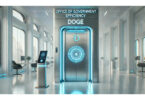This week, Houston-based technology company FuelTrust announced the launch of its new digital solution – Carbon Baseline. The technology aims to help the marine sector achieve the International Maritime Organization (IMO) goal of reducing global carbon emissions by 50% by 2050 (since 2008).
For Carbon Baseline, FuelTrust has created a cloud-based solution, which uses an AI “Digital Chemist” and blockchain technology. The requirement for carbon reduction in this industry is pressing, as maritime cargo currently produces 3% of global greenhouse gas (GHG) emissions – more than aviation.
FuelTrust Carbon Baseline uses its patent-pending AI Digital Chemist, which uses historical data to calculate GHG emissions for the lifetime of a ship. Calculating past data is necessary because the 50% emission target is from a 2008 baseline.
Blockchain is used to store the data in a tamper proof or immutable manner. This makes it easier for fleets to apply for carbon credits, and the permissioned blockchain allows only authorized people to view the data. Maintaining a truthful and accurate carbon baseline is not only important for the environmental credentials of a ship but can also have major financial implications, as tax levies and other financial decisions are calculated based on vessel performance.
“With Carbon Baseline, class or flag authorities can be provided a more accurate, third-party verified report on the emissions reductions actually achieved, meaning the fleet owner, their customers and their investors can benefit,” said Darren Shelton, Chief Product Officer at FuelTrust.
The technology relies on accurate data input from the AI Digital Chemist, which considers the molecular-level combustion calculations of different fuels, from “source to smoke”. Data on consumption patterns, voyage information, and annual fuel lifecycles can then be determined.
One issue with blockchain is the data may be immutable, but you have to be sure the stored information is accurate before it’s added to the blockchain. For example, in other industries, such as automated insurance payouts for weather events, there are concerns that some people might manipulate weather sensors used to store data on the blockchain. People could simply coordinate with others to water known sensors with hosepipes to claim on flood insurance.
While the AI Digital Chemist could be a great solution for current emissions, assessing historical GHG emissions must be based on past data. If that source data is inaccurate, then the immutable data stored on the blockchain won’t be reliable.
Meanwhile, this industry has already applied blockchain applications, with BunkerTrace releasing its DNA and blockchain solution for fuel tracing in 2019. This technology uses synthetic DNA to tag the ID of fuel used in maritime vessels to create a log of its origin and properties.






